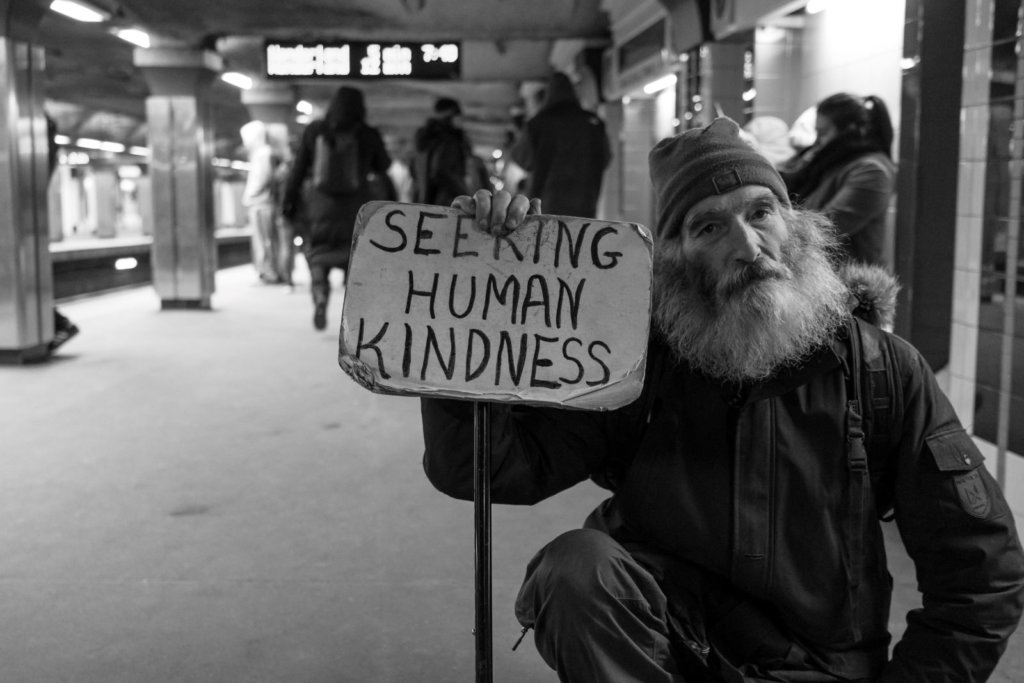I, like many, have been amused and surprised by the Louvre heist. As a quick refresher, at 9:30 in the morning, thieves in yellow vests scaled a truck-mounted ladder to the second-floor balcony of the Apollo Gallery, home to the French crown jewels, among other treasures. Using an angle grinder to force open a window, they took just four minutes to enter the room, cut open two cases displaying Napoleonic jewels, grab nine pieces, and flee back down the ladder, according to CNN.
Instead of focusing on the heist itself or the ethics surrounding museum acquisition, theft, etc., I want to talk about why I think the story is so compelling. The museum heist is giving major trickster energy. The trickster is an archetype that crosses and often breaks both physical and societal rules. Tricksters “violate principles of social and natural order, playfully disrupting normal life and then re-establishing it on a new basis,” according to author Lewis Hyde.
There are many myths about the trickster from Indigenous tribes, often centering around coyote, spider, or raven. Here’s an abbreviated version of a story about Raven demonstrating how the trickster often makes things better for everyone:
Raven was told of a well with a never-ending supply of water. When Raven arrived, it learned the man who owned the well kept it covered and never left its side. He even built his house around the well and slept by it so that no one else could drink from it. But Raven began to scheme how to get this water.
Raven disguised itself as the man’s brother-in-law and went to the man, telling him he would stay the night with him. Both went to sleep, and in the early morning, Raven left and procured dog dung that he put on the sleeping man’s butt. Raven woke the man and showed him the “accident” he had in the night. The man, embarrassed, ran out of the house to clean up. While he was away, Raven drank nearly all the water, but he was caught when the man returned. Raven escaped and flew over the land, spitting water here and there, creating the great rivers of the world.
This is the myth certain Indigenous tribes use to explain the presence of great rivers, and while in this case the Raven did something good for all of humanity, I’m not sure that’s true for the museum heist. But what interests me about the trickster is many Indigenous communities think tricksters are essential, that they help us contact the sacred. Even in sacred ceremonies, tricksters are embedded in the ceremony and mock people, make crude jokes, and crawl down ladders headfirst. They do this because these communities say the sacred comes to us through upset, reversal, surprise.
Until I listened to the Emerald Podcast, I’d never heard of that concept, but it’s so true. Some of my biggest periods of transformation arrived on the heels of upset, reversal, and surprise. I want life to go according to my plans. I want things to be neat and orderly, but they never are. What if instead of fighting that, I accepted it? What if I made space for disruption because it’s going to happen anyway? We like to pretend it doesn’t or won’t but the museum heist, the political situation, heck, even the weather, demonstrate that disruption is not the exception, it’s the norm.
For me, welcoming the trickster means accepting upset, reversal, and surprise are a part of life. Just as life is a wheel, it’s also surprising. I don’t want to keep fighting that aspect or pretending I’m in charge or in control when I’m so clearly not. This is one of the biggest spiritual lessons I’ve had to learn over and over again: surrender. For today, surrender means not only accepting that the trickster is a part of life but actively welcoming it and saying, “I’m making space for you.”
I dream of a world where we understand things never go according to plan and they aren’t supposed to. A world where we recognize the trickster is an archetype for a reason. A world where we understand the sacred and profane are the two wings of one bird. A world where we welcome the trickster.
Another world is not only possible, it’s probable.
I watched a clip of Netflix’s “Famous Last Words: Jane Goodall” and started tearing up. That woman was an icon, a messenger of hope, and someone who remained consistent until her dying breath. She exemplified neohumanism, a concept in my spiritual tradition, that begs the question, “What is the boundary of your identity?”
Neohumanism encourages bridge building not only with other people, but also with plants and animals. For Jane, she saw animals not as heartless brutes, but as beings that have rich inner lives just as humans do. They cry, experience joy, and have other emotions. From a Mongabay news piece I read, “She blurred the categorical wall that placed humans above other animals. Her work became foundational not only for primatology, but for animal welfare and environmental ethics.”
But she wasn’t an animal rights activist who said, “Screw all the humans! You’re terrible!” Instead, she tried to connect with people she didn’t see eye-to-eye with. She said, “If you don’t talk to people you disagree with, how can you expect them to change?” She understood that being a purist or isolating yourself from others only creates more isolation, and what this planet actually needs is people working together.
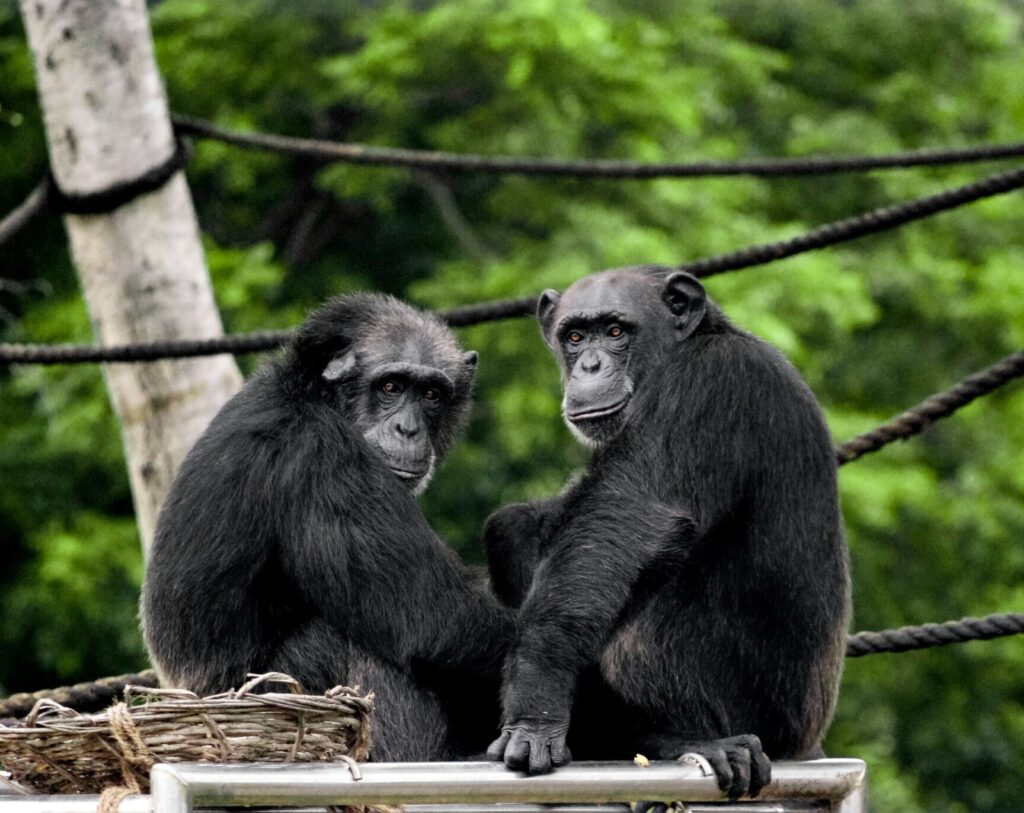
In honor of Jane, of course. Photo by Satya deep on Unsplash
Jane also followed up her words with actions by creating Roots & Shoots, a youth action program that empowers young people to be the change in their communities. It spans more than 140 countries and has projects ranging from recycling drives and community gardens to tree-planting campaigns and animal rescues. Underpinning the youth movement, and Jane’s ethos in general, is that every action matters.
“You cannot get through a single day without having an impact on the world around you,” Jane often reminded her audiences. “What you do makes a difference, and you have to decide what kind of difference you want to make.”
I keep thinking about that quote, and like I wrote about last week, that each of us has influence even if we’re not an influencer. If we accept it as fact that we impact the world every single day, what kind of impact do we want to have? Some people are hellbent on impacting the world negatively by cutting healthcare access, deporting immigrants, or laying off workers so they can further line their own pockets.
In response to those people hellbent on negatively impacting the world, it feels like everyone and their mother is asking, “How are you working to stop them?” I have idiopathic hypersomnia and panic in crowds, so I’m not capable of being in the streets. I can’t join the protests, the marches, the trainings. And I have a loooot of feelings about that. But that doesn’t mean I’m not impacting the world around me. It doesn’t mean I’m not making a contribution.
I’m not a perfect person. I make mistakes. Sometimes I’m the villain in someone else’s story. But more often than not, the contribution I make is one of kindness, empathy, and authenticity. I may not speak in front of millions, but I’ll chat with a friend for an hour so she feels seen and heard. I may not join a protest, but I’ll show up for my friend’s film premiere. Even though those actions are small, they, too, make a difference. And they’re the sort of difference I want to make.
I dream of a world where we all embody the virtues Jane Goodall emphasized as much as we can. A world where we continue to have hope, show compassion, and see every being as worthy of love and respect. A world where we understand every day we make a difference, and we consciously choose what kind of difference we want to make.
Another world is not only possible, it’s probable.
Typically, I love the Jewish High Holidays because it’s a time of joy and celebration. But this year it’s been somber because of everything happening in Gaza, plus, well, take your pick. Instead of feeling helpless and powerless, I’d rather be in the headspace that we all matter more than we think we do. To that end, I’m resharing this post I wrote for the High Holidays in 2022.
As we’re finishing the Jewish High Holidays, I think it’s only fitting to share a concept I learned about recently. In Jewish mysticism, there’s an idea that in every generation, 36 people hold up the world. These lamed-vavniks do not themselves know they are one of the 36, and no one else does either. What intrigues me about this concept is that it makes each and every person important. Basically, you think of yourself as playing a part in keeping the world spinning, and because you don’t know who else is a “righteous one,” you treat others the same.
I like this concept because it also flies in the face of our current reality. These days, there’s a perspective that if you’re not a billionaire, celebrity, athlete, politician, or influencer, you’re not worth paying attention to. In fact, a Bloomberg study found 98% of middle school and high school students would like to be a social media influencer. Some of them already are. Gone are the days of “doctor” and “lawyer” topping the career list for kids. Now they want followers. I understand, I want followers too, but the concept of lamed-vavniks says you can be powerful and important, and nobody would know about it.
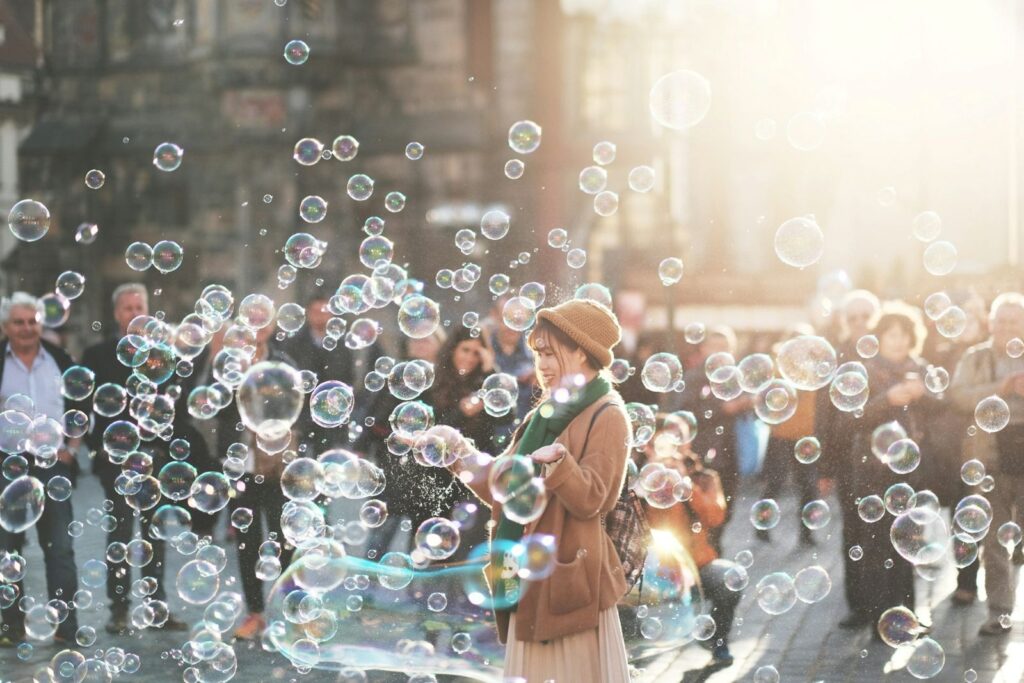
Why this photo? Because I was thinking “circle of influence” and a bubble is like a circle and. . .Photo by Alex Alvarez on Unsplash
In other words, even without being an influencer, maybe you already have influence. Elizabeth Gilbert tells a story about how years ago she was on the Midtown bus in New York. It was January, replete with sleeting wind, rain, and rush-hour traffic. The bus moved at a crawl and people were not happy. When the bus reached 10th Ave, the driver made an announcement.
He said, “Ladies and gentlemen, we are now nearing the Hudson River. I’m going to ask you to do me a favor. When you get off the bus, I’m going to hold out my hand. As you walk past me, I want you to drop your troubles into the palm of my hand. I’ll take your troubles for you, and when I drive past the river, I’ll throw them in. The reason I want to do this is because you all seem like you’ve had a bad day, and I don’t want you taking all your worries and sorrows home to your friends and families now. Because they deserve better than that, don’t they? So, you just leave your troubles here with me to dispose of, and you all go have a wonderful night, OK?”
The entire bus erupted into laughter, and sure enough, one by one, the passengers exited the bus and dropped their troubles into the palm of the bus driver’s hand. They stepped off the bus with smiles on their faces.
The people hearing this story don’t know that bus driver’s name or anything about him, but they do know he made a difference that day. We know he directly influenced the people around him without sending a Tweet. It has me wondering, are you more important than you think you are? Are you someone who is holding up the world in your own way? You can’t know for sure, so why not behave as if you are?
I dream of a world where we all understand the power we have to influence others and make a difference, even if we don’t have a million followers on Instagram. A world where we recognize that sometimes the most ordinary-seeming person is capable of something extraordinary. A world where we understand we’re more important than we think we are.
Another world is not only possible, it’s probable.
I read a letter on Facebook the other day from E.B. White (the author of Charlotte’s Web and Stuart Little) to a man who wrote to him in despair over the bleakness of the human race. It was written in 1973. I can’t say for sure why the man, Mr. Nadeau, thought the world was so bleak, but it could be because he witnessed the horrors of the Vietnam War. Regardless, I loved White’s response and I’m tweaking it so the language is more gender neutral:
North Brooklin, Maine,
30 March 1973
Dear Mr. Nadeau:
As long as there is one upright person, as long as there is one compassionate human, the contagion may spread and the scene is not desolate. Hope is the thing that is left to us in a bad time. I shall get up Sunday morning and wind the clock, as a contribution to order and steadfastness.
Sailors have an expression about the weather: they say, the weather is a great bluffer. I guess the same is true of our human society — things can look dark, then a break shows in the clouds, and all is changed, sometimes rather suddenly. It is quite obvious that the human race has made a queer mess of life on this planet. But as a people, we probably harbor seeds of goodness that have lain for a long time waiting to sprout when the conditions are right. People’s curiosity, their relentlessness, their inventiveness, their ingenuity have led them into deep trouble. We can only hope that these same traits will enable them to claw their way out.
Hang on to your hat. Hang on to your hope. And wind the clock, for tomorrow is another day.
Sincerely,
E. B. White
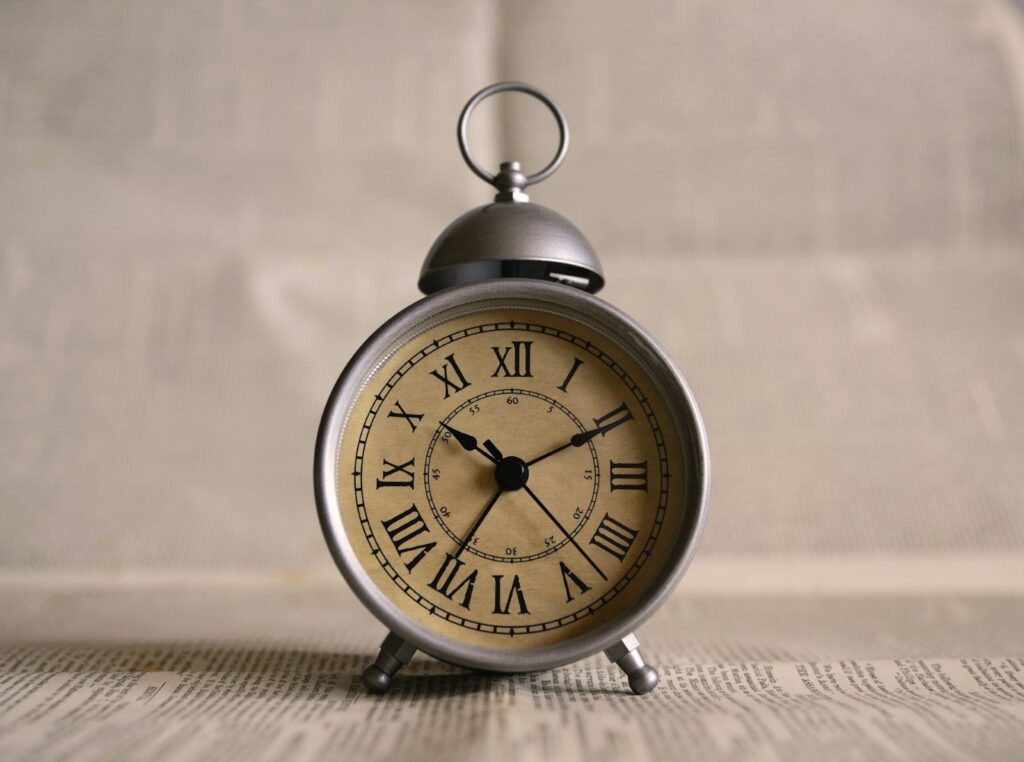
These used to need winding. Photo by Ales Krivec on Unsplash
I’m reminded of a related story about how things can change quickly. I learned recently that Romanian dictator Nicolae Ceausescu’s regime ended very quickly. He reigned for 21 years, and then in the course of two weeks, that all crumbled. This BBC article gives the whole story, but the abbreviated version is this: protests started mid-December 1989 in Timisoara, which Ceausescu quickly and violently quelled. He gave a live speech on December 21, 1989, where he blamed “fascist agitators” for the Timisoara protests, but the crowd wasn’t having it. The national broadcast was abruptly cut from the airwaves. He and his wife tried to flee the country, but they were captured and promptly executed by a firing squad on Christmas Day.
I mean, I don’t love that they were executed by a firing squad, but nonetheless, this reign of terror that lasted for 21 years did finally end. Because people were relentless. They said, “No, we aren’t having this.” The change didn’t happen overnight, but it did happen, and quickly.
It can feel easy to fall into despair, to lament the state of the world and think nothing will ever change, but what’s more true is that we have evidence over and over again that it does. There is always a break in the clouds and the sun shines again. There are more compassionate, upright moral people in the world than the opposite, even if the news tries to convince us otherwise. We cannot control when or how positive changes will occur, but we can keep “winding the clock.” And that’s exactly what I plan to do.
I dream of a world where we remember tomorrow is another day. A world where we understand there will always be a break in the clouds and the sun will shine once more. A world where we recognize things can, do, and will change. A world where we hold onto hope and do our part by winding the metaphorical clock.
Another world is not only possible, it’s probable.
It’s amazing how this post from exactly five years ago is still relevant. It was in the middle of COVID, but the same issues remain.
Lately, I’ve been thinking about fairness, or rather its opposite. How it’s not fair that people we love die. Or that fascist leaders are calling the shots. Or that the world literally and figuratively burns so a few companies can increase their profits. It’s not fair.
If you’re anything like me, in response to, “It’s not fair,” someone invariably says, “Life isn’t fair,” as if that makes the situation better. The inherent message behind “life isn’t fair” is “deal with it.” But what if I don’t want to deal with it? What if I don’t want to toughen up and accept the unfairness of it all? What if I’d rather curl into a ball and whimper like a wounded animal? Can I do that instead?
This year has been absolutely gut-wrenching for numerous reasons. NUMEROUS. I’m over this year. I want something new, and yet wanting isn’t enough. As they say, faith without works is dead. I’ve also heard that pain is the price of admission into a new life. Ouch. Say it ain’t so, but it is.
When I think about creating something new – art, a business, a life even – there’s often an element of pain, or at least hardship. Rarely is the creation process smooth sailing from start to finish. There are usually obstacles to overcome, hurdles to clear. Maybe this period we’re in, maybe this year, is the admission price we’re paying for a new way of life.
It seems to me humanity is being forced to change on numerous fronts. It’s become clear we cannot maintain the status quo because doing so equals death and destruction. Change isn’t easy, and honestly, sometimes it sucks, but I have to believe everything we’re enduring is leading to something better. It’s the only way I can keep going, to continue putting one foot in front of the other. I’m also choosing to believe my spiritual teacher who said, “[A] bright future awaits you. Your future is glorious, your future is luminous, your future is effulgent.”
He describes himself as an incorrigible optimist and also said, “Human civilization now faces the final moment of a critical juncture. The dawn of a glorious new era is on the one side, and the worn-out skeleton of the past on the other. Humanity has to adopt either one or the other. You are the spiritual soldiers; you are the worshippers of life divine. Hence, I call upon you to adorn this crimson dawn deluged with glorious light. Victory is surely yours.”
We’re not on the other side of the fight yet. The world remains unfair, but slowly, in certain places, we’re moving in that direction. For instance, in Portland, companies must pay a 10% tax surcharge if their CEO earns 100 to 250 times more than the median-paid worker. That number jumps to 25% if the CEO makes 250 times more than the median-paid worker. The law only applies to Portland, but other places like San Francisco are considering similar laws. Laws like these are a start and show me if we keep striving for a fairer society, eventually it will happen.
I dream of a world that’s fair and just. A world that considers what’s in the best interest for the planet as a whole. A world where we realize the impact of our actions and adjust accordingly. A world where we understand that sometimes the price of admission into a new life is pain.
Another world is not only possible, it’s probable.
As we’re approaching the July 4th holiday, a time that supposedly celebrates freedom and independence, I’m reminded of this post from five years ago. Enjoy.
What does it mean to be free? Some people would say it’s doing whatever you want, whenever you want. But is that really true? In Rebecca Solnit’s excellent essay on “Masculinity as Radical Selfishness,” she mentions the axiom, “My right to swing my arm ends where your nose begins,” which is about balancing personal freedom with the rights of others. It’s also about watching out for someone else’s rights. However, what we’re seeing is the idea that my right to swing my arm doesn’t end where your nose begins, but instead just doesn’t end. And in fact, your nose is not my problem, and it should get out of the way.
She also says in the U.S., “unlimited armswinging peaks at an intersection between whiteness and maleness, with plenty of white women on board who seem to believe that a white lady’s job is to protect white men’s armswinging (often with a selfless disregard for their own noses).” What we’re seeing is peak entitlement and conflating “freedom” with hypermasculinity as well as white supremacy. Who is it that thinks they should have unlimited armswinging? White men (but not all white men, to be clear).
This is incredibly juvenile and shortsighted because no person is an island (even if they have enough money to buy one). We don’t live in our own self-contained bubbles, able to accomplish everything by ourselves. We want someone else to cut our hair. We want someone else to make our food. Humans are social creatures. We are not meant to live in isolation.
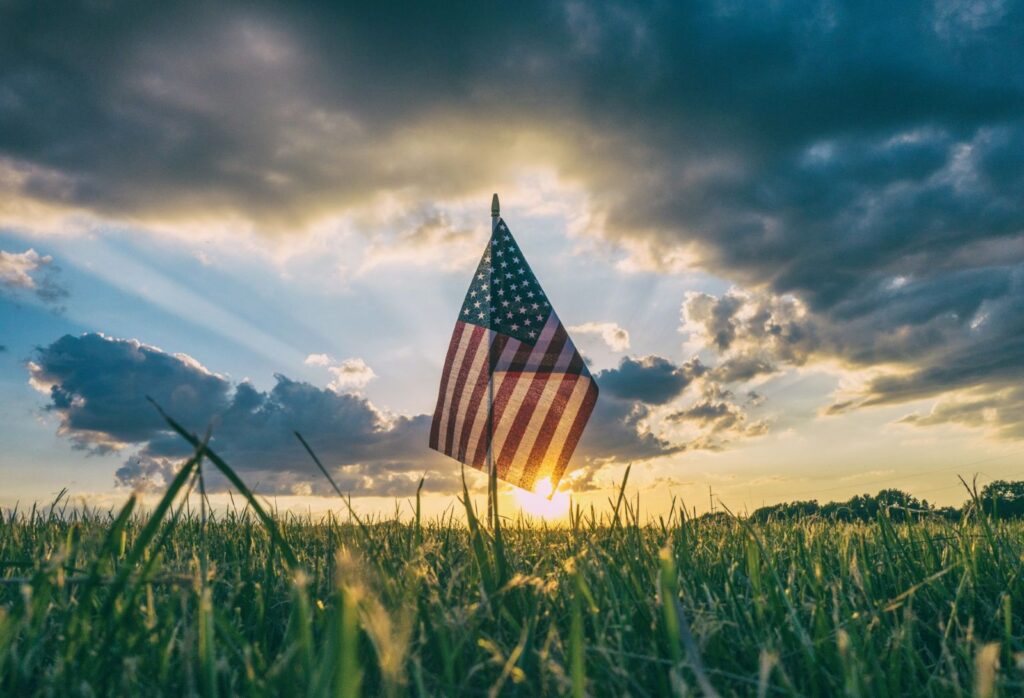
Real freedom requires limits. Photo by Aaron Burden on Unsplash
The hypermasculine freedom some in the U.S. idealize is a myth because what happens when that individual gets sick? They rely on the collective to help them out – they go to the hospital for care, or a doctor, or the drugstore.
My spiritual teacher says, “Just as my life is important to me, others’ lives are equally important to them; and if we do not give proper value to the lives of all creatures, then the development of the entire humanity becomes impossible.”
It becomes impossible because individual life is bound to the collective. Collective welfare lies in individuals, and individual welfare lies in collectivity. There is no instance where my individual welfare doesn’t contribute to collective welfare. And furthermore, real freedom requires constraint. That may seem like an oxymoron but hear me out.
Retired Navy SEAL, author, and podcaster Jocko Willink says, “Freedom is what everyone wants – to be able to act and live with freedom. But the only way to get to a place of freedom is through discipline. If you want financial freedom, you have to have financial discipline. If you want more free time, you have to follow a more disciplined time management system. Discipline equals freedom applies to every aspect of life: If you want more freedom, get more discipline.”
He’s talking specifically about individual freedom, of course, but I think the same message applies to collective freedom. We’re able to drive safely, for the most part, because there are rules associated with driving. We’re able to buy food we enjoy because there are regulations that keep expired food off the shelves. I realize there are problems with the rules and regulations I listed, but I’d much rather have those problems than going into a grocery store and wondering if the food I’m buying will poison me.
Real freedom requires discipline and a care for others. Anything else is just selfishness that will eventually catch up to us.
I dream of a world where we recognize true freedom requires giving up a little bit of freedom. A world where we understand we can’t do what we want whenever we please without consequences for ourselves and others. A world where we understand there’s an inherent relationship between freedom and limitation.
Another world is not only possible, it’s probable.
I had a poignant experience on Wednesday. First, some context. I’m a Network Spinal Analysis practice member. It’s a technique that relieves tension from the spinal cord with the gentlest of touches. According to Network Spinal Analysis Founder Dr. Donny Epstein, there are 12 stages of healing. These aren’t linear or hierarchical, they’re more like seasons.
Stage one is suffering. It’s an awareness that something is wrong and it’s time to connect with the reality of what is. It’s being with the body to bring ease and compassion to the self. Stage 12 is about community. It’s recognizing that our wholeness comes from bringing our gifts of individuality into the collective. It’s also about receiving gifts from others so there’s a loop of giving and receiving.
On Wednesday, I had a call with other Network Spinal Analysis practice members, and we did breathing exercises relevant to our respective stages. While I did the stage one exercise, the rest did stage 12. Oof. That’s so hard because I take service seriously. It’s one of the core tenets of my spiritual tradition and I always feel pressure to do more and/or that I’m not doing enough.

Sometimes you need to be held by the collective. Photo by Becca Tapert on Unsplash
And in these times where I know we are the “magic wands,” that change happens because we make it happen, my desire to contribute is immense. It feels like if I’m not doing something, I’m letting the fascists win. But, well, my body needs a break. It’s made that very clear. The breathing call showed me viscerally that I don’t always have to be “on” or giving my gifts. I don’t have to always contribute to society because other people are giving their gifts. Other people are fighting the good fight and when I’m ready, I’ll re-enter the metaphorical arena and give someone else a break.
This is how the collective works. We hold one another as we cycle through our various rhythms.
My spiritual teacher says, “The movement of human beings in this universe is not movement for movementʼs sake, but is comparable to a joyous pilgrimage …. Suppose one among them is attacked by cholera, do the rest go on their way, leaving him behind? No, they cannot. Rather, they break their journey at the place for a day or two, relieve him from the disease, and help him to acquire strength in his legs. Or, they start out anew, carrying him on their shoulders. If anyone runs short of her subsistence, others give her their own. Together, they share everything with all. Together, they stream ahead, singing their leading chorus.”
Later, he says it’s when people “attain a deep psychic affinity while traveling together [this is what] helps them solve all the problems in their individual and social lives.” It’s humbling to admit that sometimes I’m the person who has cholera, metaphorically, but nonetheless, it’s true. And instead of beating myself up about it, I can relax and remember I’m a pilgrim on a pilgrimage and there’s a collective that’s holding me and holding all of us.
I dream of a world where we realize we all cycle through periods of rest and contribution. A world where we give when we can and let ourselves receive when we need. A world where we trust that we don’t have to do everything all the time because there’s a greater collective that’s holding us.
Another world is not only possible, it’s probable.
I didn’t attend any of the rallies on April 5th because I panic in crowds. And while I know it’s important to take care of myself – and I would have been a liability rather than an asset in that situation – it’s bringing up a lot of feelings. Because I care so much about society, I feel like a bad person. What am I doing to fight fascism?!? Do I make a difference in this world even if I can’t participate in the way I’d like?
The answer is yes. A recent Psychology Today article states when we do an act of kindness, we inspire positive change far beyond the person we’re helping – not just by one degree but three, according to social scientists James Fowler and Nicholas Christakis. For instance, if you help a stranger with their suitcase at the airport, that person may feel uplifted and, in turn, pass on the positive energy to someone else. The same applies to the onlookers, who, in turn, may pay it forward to their social circles. In other words, kindness is contagious and can spread in ways you’ll never know about.
Also, our social networks are much more interconnected than we realize. As the Psychology Today author Emma Seppälä writes, “You may not directly know someone’s friends, but your kindness can impact them just the same, thanks to the invisible threads of connection that link us all. It’s as if we are all part of a giant, complex web of goodwill, where every action – good or bad – reaches farther than we expect.”
For people interested in spreading kindness, Seppälä recommends doing things like complimenting someone, leaving a positive note for a coworker, listening with empathy, and supporting local causes. Those are things I do regularly so from that perspective, I do make a difference, and I’m sure you do too. I can’t necessarily quantify the difference I’m making – I haven’t saved anyone from a burning building or written a bill to support my community, but I’m trusting the small actions I take ripple and spread.
I’m reminded of a quote I use a lot from my spiritual teacher who says, “If one ant meets a premature death, it will disturb the balance of the entire cosmos. Therefore, nothing here is unimportant, not even an ant.” Later on, he affirms that “nobody is unimportant, nobody is insignificant. Each and every existence is valuable.”
I’m not a famous person. I’m not in a position of political power, but my existence is still valuable. My actions are still important even if they aren’t things like going to rallies or marching on Washington. Every day, I say an oath to help others according to my capacity and oftentimes, that means something small. Will I help topple fascism? Unclear. But as I’m learning from research, my influence is much greater than I think it is. Up to three times more, in fact.
I dream of a world where we realize we all have a role to play in this life. A world where we understand we all have different ways of showing up to help others. A world where we remember we aren’t unimportant, we aren’t insignificant. A world where we understand our sphere of influence is three times greater than we think it is, and keeping that in mind, we act with kindness.
Another world is not only possible, it’s probable.
The title of this post comes from a fascinating article I read in my university’s alumni magazine. More than 15% of the global population – about 1 billion people – have been diagnosed with a physical, psychiatric, learning, developmental, sensory, or cognitive disability. And that number is likely to increase due to emerging diseases and natural disasters.
We treat disability like it’s abnormal but the reality is anyone who lives long enough will become disabled either because of an accident or age. For this reason, author and bioethicist Ashley Shew uses the term “temporarily able-bodied.” Yeeees. When I first heard that term, my entire body relaxed because it made so much sense and also reframed my experience as someone with idiopathic hypersomnia. Because I have to nap every day and am easily tired by too much activity, I perpetually feel abnormal. Why can’t I do the things other people can do? And how can I regain health privilege as quickly as possible?
Getting the reminder that people who aren’t currently disabled are experiencing something temporary helps me to feel better. It means I’m not abnormal and instead, other people are going to “catch up” to me, so to speak. I’m learning to live with disability sooner than other people but health privilege is temporary for everyone if they live long enough. To be alive means to have a body that will eventually break down. Instead of feeling envious of other people, I’m working to unapologetically love my body as it is, right now. There’s nothing wrong with me even though an ableist society says otherwise.
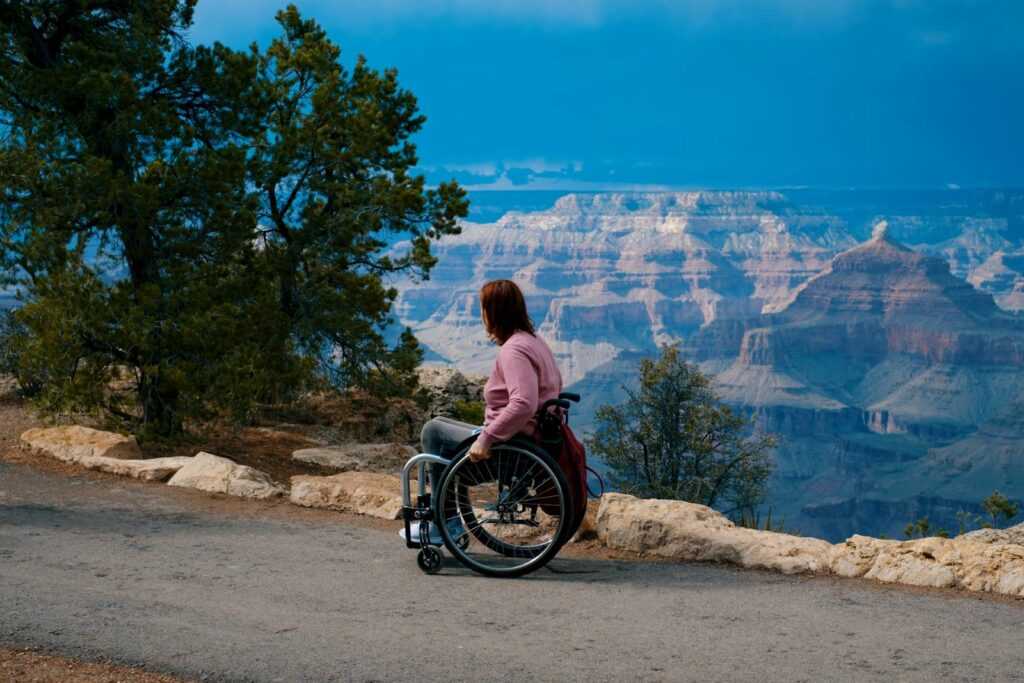
An excellent example of accessibility — not everyone can hike a rugged trail but paved trails allow those with mobility issues to see these natural wonders. Photo by Romain Virtuel on Unsplash
If you’re unfamiliar with that term, ableism is a system of discrimination and oppression that favors nondisabled lives and ways of being, often under the guise of empowerment. For instance, prosthetic legs enable amputees to walk “normally.” That’s not to say technology can’t make life easier for disabled people – it does – but society encourages disabled people to see themselves as chronically incomplete or lacking. There’s something wrong with them because they’re not able-bodied. This distracts from the real social ill, that “the world is set up to exclude disabled people,” to quote Shew.
The reality is we’re not all meant to be the same. My spiritual teacher says, “Human society is just like a garland which is made of different types of flowers, woven together by one common thread. The overall beauty of the garland is dependent upon the beauty of each flower. Likewise, each strata of society must be equally strengthened if we are to maintain the unity and solidarity of society.”
So first, diversity is the name of the game, and two, each strata of society must be equally strengthened. That means recognizing there is a place for everyone and furthermore, creating a more inclusive society that plans for the fact people are temporarily able-bodied. Instead of making people feel incomplete or ashamed for losing health privilege (or never having it in the first place), we’d be better off recognizing disability is inevitable. What are we doing to make the world easier, better, more inclusive, and more accommodating? Because after all, the future is disabled.
I dream of a world where we understand health is a privilege that eventually everyone loses. A world where instead of trying to hold on to health privilege, we create a society that accommodates disability. A world where we strengthen all segments of society because we recognize disability is a fact of life. A world where we recognize the diversity of human beings is beautiful, just like a garland.
Another world is not only possible, it’s probable.
In July I wrote a post called “The Dawning of a New Age” about the end of an era and the beginning of a new one. I thought Kamala would be elected and that would kickstart a progressive, egalitarian age. Pluto was set to move into Aquarius and the energy of that is, “Screw top-down hierarchy – give me bottom-up! Power to the people, baby!”
When Trump was elected, I was so confused and disappointed because his election represented a consolidation of power and the worst of Pluto in Capricorn. This isn’t the “power to the people” I was expecting! But, well, we are seeing more people becoming engaged. The Washington Post reported on February 7 that congressional phone lines have been jammed to the point of failure. A system that usually handles a few dozen calls per minute is straining to keep up with more than 1,500.
Representative Becca Balint, Democrat of Vermont, said she normally has two aides monitoring the office phones, enough to handle the handful of calls they typically receive each hour. But since Jan. 20, she has reassigned at least six additional staff members to keep up with a nonstop flood of calls. “What we usually get in a month, we got in three days,” said Sophie Pollock, a spokeswoman for Balint.
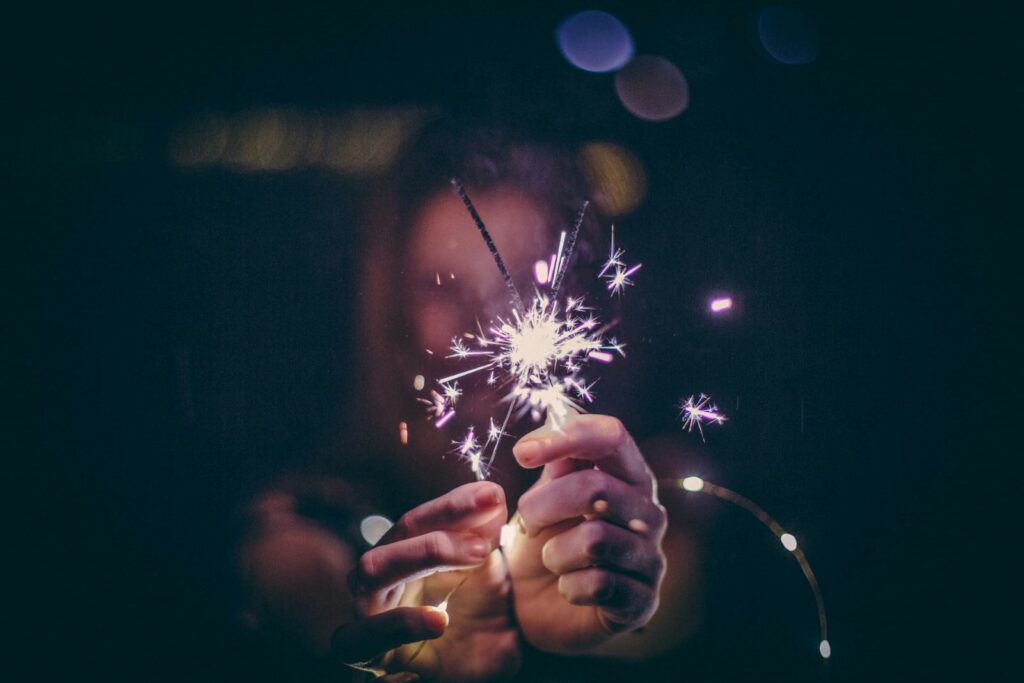
It’s us! We’re the magic wands! Photo by nine koepfer on Unsplash
For better or worse, Trump is a galvanizing figure on both sides of the political aisle. He is encouraging more people to get involved in one way or another. That’s something. And it relates to a journal entry of mine from a few weeks ago. I want a magic wand to make everything better. Or a Deux Ex Machina situation. Maybe some aliens to set us straight. Higher Power said to me, “I want there to be lasting change. I want you all to do the work to create that beautiful future you dream about.”
Ugh, no! It’s too hard! But when I accept the truth that I do want to do something, that I can’t just be a good person and enjoy my life, then I get overwhelmed. Little ole me? What can I possibly do? I need a nap every day! Sometimes I take two! How am I supposed to make any kind of difference? For that, I return to a quote by Rutger Bregman in the now-defunct publication The Correspondent:
“Our inclination – in talk shows and around dinner tables – is to choose our favorite kind of activism: We give Greta Thunberg a big thumbs up but fume at the road blockades staged by Extinction Rebellion. Or we admire the protesters of Occupy Wall Street but scorn the lobbyists who set out for Davos.
“That’s not how change works. All of these people have roles to play. Both the professor and the anarchist. The networker and the agitator. The provocateur and the peacemaker. The people who write in academic jargon and those who translate it for a wider audience. The people who lobby behind the scenes and those who are dragged away by the riot police.”
In other words, we need everyone – not only certain kinds of activists. Our actions may not make a splash, they may seem small, but they’re not insignificant. Because in order for change to happen, there are many, many roles to play. It’s not the size of the role that counts, it’s that we’re doing anything at all.
I dream of a world where we recognize there are no shortcuts. A world where we understand in order to create something progressive and egalitarian, we have to put in the work to make it happen. A world where we realize no matter the role we play, it still counts and adds up to something. A world where we recognize we are the “magic wands” we’ve been dreaming of.
Another world is not only possible, it’s probable.


